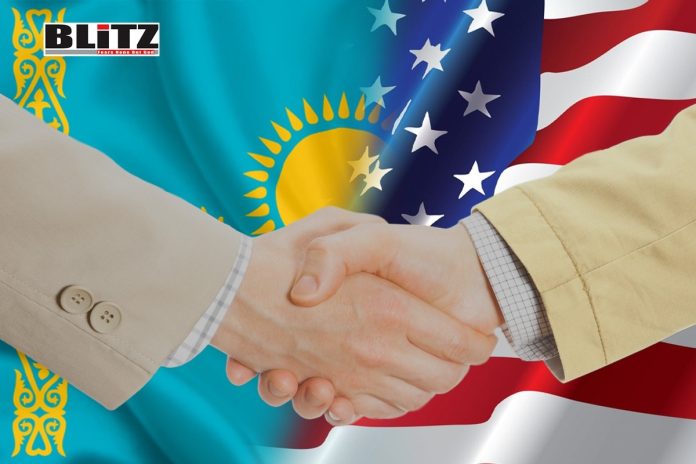Amid escalating great power competition, the bond between the United States and Kazakhstan gains unprecedented prominence. Central Asia, often overlooked globally, now emerges as a pivotal arena where geopolitical currents reshape strategic landscapes. In the shadows of Russia’s assertiveness in Ukraine and China’s expanding influence, Kazakhstan’s pivotal status as a regional powerhouse provides fertile ground for strategic alignment between Astana and Washington. This moment presents an opportune time for both nations to forge a robust alliance, leveraging Kazakhstan’s strategic position and growing influence to advance shared interests and counterbalance rival powers.
As dynamics evolve in Central Asia, the necessity for heightened US involvement becomes increasingly evident. With Moscow’s extended influence in Ukraine and Beijing’s accelerated economic and infrastructural ventures, Washington must adapt its strategy to effectively counterbalance these developments. Kazakhstan, boasting a growing economy and strategic positioning, emerges as a pivotal cornerstone for advancing US interests within the Eurasian sphere.
A critical factor in strengthening US-Kazakhstan relations involves striking a nuanced equilibrium between Astana’s ambitions and Washington’s capacities. Deputy Prime Minister and Foreign Minister Murat Nurtleu’s recent trip to Washington highlights Kazakhstan’s keenness to enhance bilateral collaboration across diverse spheres. Dialogues focused on rejuvenating the Strategic Energy Dialogue and broadening trade ties underscore shared objectives in promoting economic growth and bolstering energy stability.
The strategic convergence between the United States and Kazakhstan extends beyond bilateral cooperation to regional initiatives aimed at bolstering connectivity and economic integration. The B5+1 Forum, which brings together business leaders from Central Asia and the United States, signifies a concerted effort to enhance foreign investment and promote sustainable development in the region. Against the backdrop of geopolitical rivalries, initiatives like the B5+1 Forum serve as critical platforms for fostering economic resilience and regional stability.
Kazakhstan’s proactive approach to fostering connectivity and economic integration underscores its pivotal position in shaping the geopolitical landscape of Central Asia. Amid the region’s intersection with competing power dynamics, Astana’s adept maneuvering to balance relationships with major players while strengthening ties with the United States assumes paramount significance. Through deeper engagement with Kazakhstan, Washington stands to effectively counterbalance the influence of rival powers and advance its strategic imperatives in the region. Astana’s strategic acumen in navigating these complex dynamics presents an invaluable opportunity for the United States to consolidate its position and shape the trajectory of Central Asia’s geopolitical future.
Central to the enhancement of US-Kazakhstan relations is the utilization of Kazakhstan’s strategic assets, notably in the energy and minerals domain. With ample reservoirs of rare earth elements (REE) and uranium ore, Kazakhstan offers avenues for strategic cooperation to broaden global supply chains and diminish reliance on China. By directing investments towards critical sectors like clean energy and mineral exploration, the United States and its allies have the potential to not only augment Kazakhstan’s economic growth but also curtail China’s hegemony in pivotal strategic sectors.
Yet, advancements in fortifying bilateral relations between Washington and Astana have been stymied by bureaucratic barriers and archaic policies. The lingering presence of the outdated Jackson-Vanik Amendment, a vestige of the Cold War era, persists as a hindrance to trade relations between the two nations. Overcoming these obstacles and ushering in modernized trade policies is imperative to fully harnessing the vast potential of cooperation between the United States and Kazakhstan.
In the forthcoming years, the United States must embrace a more resilient and visionary approach towards Central Asia, transcending electoral fluctuations to prioritize enduring geopolitical objectives. As Kazakhstan grapples with the intricate dynamics of great power competition, Washington must exhibit steadfast dedication to bolstering bilateral relations and endorsing Kazakhstan’s endeavors to foster stability and prosperity in the region. Embracing this steadfast commitment is essential for navigating the evolving geopolitical landscape of Central Asia effectively.
The escalating great power competition in Central Asia highlights the increasing importance of the relationship between the United States and Kazakhstan. Strengthening bilateral cooperation, promoting regional integration, and capitalizing on Kazakhstan’s strategic resources offer the United States effective means to advance its interests in the area and mitigate the influence of competing powers. As the geopolitical dynamics undergo constant flux, adopting a proactive and forward-looking strategy becomes essential to effectively maneuver through the intricacies of Central Asia and promote mutually beneficial strategic goals.




